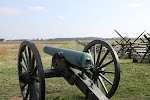Eugene Bunch wasn’t just a train robber. He was “jovial, jolly and gay – a typical bandit, who thought his profession of road agent a brave and proper one,” according to the railroad detectives who chased after him. He reportedly tipped his hat to female train passengers and declined to take their handbags. He was equally courteous to his male victims but did relieve them of their wallets. Express agents noted he never raised his voice when he threatened to blow their heads off if they didn’t open their safes. His take from a host of robberies was estimated in the hundreds of thousands of dollars.
For five years, from 1887 to 1892, Bunch
stayed a jump ahead of a bevy of railroad detectives as he robbed trains in
Texas, Louisiana, Mississippi, Georgia, and Florida. His home
in Washington Parish near the Pearl River provided plenty of remote hiding
spots if the law got too close.
 Eugene F. Bunch was born in Mississippi in
1843 to well-respected parents. The family moved to Tangipahoa Parish in his
youth and ensured he received a good education. During the Civil War, he
enlisted in the 3rd Louisiana Cavalry and apparently served well in the
campaigns around Baton Rouge and Port Hudson, although he developed serious
drinking and gambling habits.
Eugene F. Bunch was born in Mississippi in
1843 to well-respected parents. The family moved to Tangipahoa Parish in his
youth and ensured he received a good education. During the Civil War, he
enlisted in the 3rd Louisiana Cavalry and apparently served well in the
campaigns around Baton Rouge and Port Hudson, although he developed serious
drinking and gambling habits.
At the close of the war Bunch returned to
Tangipahoa Parish and opened a school at Amite. He married a Louisiana girl,
Flavia Flynn, in 1869. School teaching
didn’t agree with him—probably because of his excessive drinking—so Bunch
loaded up his pregnant wife and moved to Gainesville, Texas in 1874.
Bunch taught school briefly in Gainesville
before being elected to three consecutive two-year terms as the Cooke County clerk. He apparently used his position as an insider
to discover buying opportunities and operated a profitable land speculation
business. Grumbling among the populace over this conflict of interest deterred
Bunch from seeking a fourth term.
After leaving his government job, Bunch’s
difficulties with alcohol and gambling returned. With financial problems and a strained
marriage, he left the family in Gainesville and moved to Wichita Falls where he
briefly worked as a real estate agent and edited a newspaper. He abandoned his
family in 1886, never to see them again, and started a new career as a train
robber.
His string of robberies across the South
rivaled those of the James-Younger gang in the Midwest. His gang was rather small and included a “Colonel
Hopgood” who was wanted for murder in Mississippi. Sometimes Bunch boarded and robbed trains
singlehandedly.
Railroad detectives chased after Bunch for
years. After robberies, he would return to the Pearl River area separating
Louisiana and Mississippi. The remote area along the state line was the perfect
hiding place with is swamps teeming with alligators and cottonmouths.
But eventually the Detectives Thomas
Jackson and C.O. Summers tracked Bunch down near his home. Jackson had been responsible
for capturing the Rube Burrow gang, the other notorious train robber of the
South. Newspapers across America gave a graphic account of the August 21, 1892
confrontation:
“Eugene Bunch, the noted train bandit, who
in the past five years has held up many trains in Texas, Louisiana,
Mississippi, and Florida was riddled with bullets and instantly killed
yesterday morning near Franklinton a small town in Washington parish, Louisiana
by Detective Jackson, the tireless pursuer and destroyer of the Rube Burrow
gang.
“About two weeks ago Detective Sterling,
who had wormed himself into the good graces of the Bunch gang became suspected
by them and was ambushed and killed. Since then Detective Jackson has been hot
on their trail. Such information was obtained from two of the gang captured
last week that Bunch and his chief henchman, Colonel Hopgood, were located and
yesterday morning upon obtaining a sight of them, the entire posse opened fire
on Bunch, riddling his body with bullets. Bunch died game, firing back two or
three times, but without effect.
Probably from his injuries, Hopgood surrendered without a struggle.
“Bunch’s remains were fully identified and
there is no doubt that one of the most desperate and successful train robbers
known is now no more.”














C'nel Hobgood was my great, great grandfather on my mom's side.
ReplyDelete